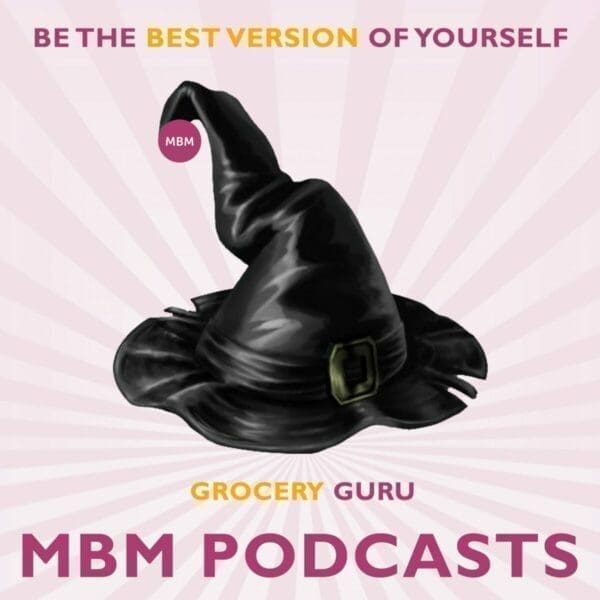Podcast: Play in new window | Download
Grocery Guru Episode 2: Category Management is Dead
Is Category Management Dead? In episode 2 of Grocery Guru, Andrew Grant and Darren A. Smith talk about how the pandemic has affected Category Management. Is it completely dead, dying, or changing into something else to adapt to the needs and demands of consumers? The age-old question. If Category Management is about meeting the shopper’s demands better and quicker than the next guy, then it’s a ‘No’.
You Can Read the Full Category Management is Dead Episode Transcript Below:
Darren A. Smith:
This is Week Two and we’re here with the Grocery Guru that is Andrew Grant. Hello? How are you doing?
Andrew Grant:
I’m good Darren, how are you?
Darren A. Smith:
Hey, I’m good, I’m good. This is Week Two of our Grocery Guru and last week, we were talking about UFC, which I thought was Ultimate Fighting Champion, but you corrected me and said it’s urban for Urban Fulfillment Centers.
Andrew Grant:
Right. Second time. Yeah.
Darren A. Smith:
I remember, so would you just give us 30 seconds on UFC? What was that all about?
Andrew Grant:
Right. Well, if I can remember a week ago, right. The future really of retailing and what we’re going to talk about today, I think carries on from there. But basically, grocery home shopping has grown faster since March than in the previous 10 years. Because clearly so many people at home, people not wanting to go and wander around a Superstore because of the physical distance rules. They’ve all ordered home shopping.
Andrew Grant:

Home shopping is now, I hope I’ve got my numbers right, can be up to 30% of the supermarkets turnover. And it’s only going one way. As a result, we’re having to find ways to pick stuff more efficiently. And the likes of, I think I said last week, Cardo has spent gazillions on massive, great automated factories. People like Tesco, and Sainsbury’s use people in-store to pick the stuff, and if you’ve got 50% of your business you’re going to have more people picking than you have customers.
Andrew Grant:
What they’ve very cleverly done and we talked about the good old days where stores had stock rooms. They’re taking the biggest out of town stores, which we all know are slightly white elephants now, and turning half of them over to picking spaces for home delivery.
Darren A. Smith:
Okay.
Andrew Grant:
These are now called dark stores or Urban Fulfillment Centers. Tesco, I think I’ve got 17 planned in the next year.
Darren A. Smith:
I remember you telling me about the winners and the losers. We’re looking at Albi and Lidl possibly losing and Tesco, probably winning and Asda. Is that right?
Andrew Grant:
A big opportunity for Asda because they’ve got the biggest stores in the out of town locations, new owners who are convenience experts, not necessarily Superstore experts. Yeah, you could see those massive Asda stores, half of them going dark and becoming a picking centre.
Darren A. Smith:
Right. Okay. Okay. And then you left us with a cliffhanger last time, very good film, very old, maybe for another time, Sly Stallone. And you talked about category management is dead. Now I’ve heard that term before and it’s quite a provocative… category management is dead. What did you mean by it?
Andrew Grant:
Yeah, I think it’s demise has been well-publicized probably for the last 15 years. I think when shopper loyalty data first came in they said category management was dead. But I think finally it is. And this move to home shopping and these Urban Fulfillment Centers that will be the nail in the coffin of traditional category management.
Andrew Grant:
If you are a traditional grocery supplier selling tins and packets that are relatively undifferentiated. Because if half of the business is picked dark-
Darren A. Smith:
Yep.
Andrew Grant:
… then all your cans, all your packets of cereals all your tins of stuff will be in the dark side of the store. And who’s going to come in in future and want to browse the canned veg aisle. Yeah. If you go around to Superstore now, which are the aisles which are the emptiest? It’s the pet food aisle, it’s the canned veg and canned fruit aisle. Everybody’s in the ready meal aisle or produce or the meat department.
Darren A. Smith:
Yeah, the sexier aisles. Yeah.
Andrew Grant:
It’s experiential do they call it? Where people want to look at the tomatoes and buy the tomatoes that are just the right ripeness for them. I like slightly green bananas. You probably like very ripe bananas. I won’t buy a steak online because how do you know you’re not getting the off cut? You want to be able to choose the rump steak that you want for your dinner.
Andrew Grant:
I think the future is literally category management will split in half. You’ll have half a store where people go in if you like for the experience, they want to see the fresh food and they want to see the meat and the produce and touch and feel, and smell, et cetera. But then who bothers, everybody knows what a can of beans is.
Andrew Grant:
Why not have that hidden, picked and delivered to your home because it’s a can of beans. I think this major challenge going forward for the like… some of the big branded manufacturers in those categories, your Heinz’s and your Kellogg’s because you don’t have physical placement anymore. And category management is all about physical placement.
Darren A. Smith:
All right. Let me just take you back a bit because a few people over the years have said to me, category management is dead and we interviewed a guy, who wrote a book. Andy did actually, Category Management is Dead. And I get to a point where I go category management is simply meeting the shopper’s needs. That’s never going to change. Isn’t category management a lie, because you’re saying it’s going to change?
Andrew Grant:
Okay. Yeah. Maybe it’s not dead maybe it’s like one of those mutant creatures that just morphs into something different. Yeah. I feel like Alien, it doesn’t actually die, just turns into something else. You’re right. Category management as somebody once said to me is about disappointing the fewest customers.
Darren A. Smith:
Because I remember when I was a Sainsbury’s Ready Meals Buyer, we put in our diaries Category Management on a Friday afternoon.
Andrew Grant:
You joke…
Darren A. Smith:
That’s crazy. But that was in the 90s. We did Category Management three hours a week. The rest of the time, we don’t know what we did.
Andrew Grant:
I don’t remember the nineties, Darren. So you’d have to remind me about that.
Darren A. Smith:
All right, so what then about my other challenge, which is we’ve got a whole bunch of suppliers that split into three. They split into those that sort of getting category management, whatever we call that, meeting the shopper’s needs, embracing it. Those that have bought the data, but sort of wince when they pay the bill and don’t use it. And then those that go [nyeah 00:06:22] category management still a bit odd. Are we really going to leave most of those behind now?
Andrew Grant:
Well, some of them potentially have already been left behind. Your big branded players have been putting money into shopper insight probably for the last 10 years. And you see somebody like Gillette, Gillette now has the Gillette club where you sign up to get your razorblades direct. I think they bought… was it Harry’s Razors they bought as well? The home of subscription razors.
Andrew Grant:
People like Procter & Gamble, Gillette are already trying to get direct to the shopper so that they have that insight. For me, yeah, the big branded players will have the money to pump the money into shopper insight rather than traditional category management. As ever, it’s your secondary and tertiary brands and to some extent, your home brand players, who, as you say, either need to see the light and that’s what we’re for, or they don’t do it.
Andrew Grant:
And you will get left behind if you don’t embrace, as we call it, shopper insight management or shopper-led insight management, SLIM for short, yeah. [crosstalk 00:07:40]. You need to embrace that.
Darren A. Smith:
And so if we take traditional category management and those suppliers that were in, I think this middle group of those that buy a huge amount of data. But wince when they pay the bill and don’t do much with it, actually what’s going to happen is not only do you need the data but you need data on e-commerce on those online shopping sites and you’ve got to embrace it. Oh, crumbs, you’re going to get left behind twice.
Andrew Grant:
Yeah. Well, people that buy the data and don’t use is a bit like buying a sports subscription for your telly and never watching a football match. What’s the point?
Darren A. Smith:
Well, they do it because they think they should, they need to be seen to have it, but we’ve over the years, worked with many, many clients who have spent a quarter of a million pounds on data and done chuff all with it.
Andrew Grant:
Yeah. Yeah. Anyway, there are the insights for this week. Category management is morphing. Maybe it’s not dead. It’s certainly morphing into something very different and it’s been accelerated by what we’ve all had to go through the last six months.
Darren A. Smith:
And interestingly, a client who won’t be named has just asked us to set up an e-commerce training program for category management, because they want to get right ahead. And they’re setting up a team of 10 people as well.
Andrew Grant:
Yeah. Yeah.
Darren A. Smith:
I think they’re one of the ones that are cutting edge, putting aside the Cokes and the Gillettes who are obviously doing it anyway.
Andrew Grant:
Yeah. I see. You are quite right.
Darren A. Smith:
Okay. Category management is dead, Urban Fulfillment Centers. All right. What are you going to tease us with for next week?
Andrew Grant:
Cool. Have I got a cliffhanger for next week? The cliffhanger is there is no cliffhanger.
Darren A. Smith:
There’s a what?
Andrew Grant:
The cliffhanger is, there is no cliffhanger.
Darren A. Smith:
Okay. All right, Grocery Guru.
Andrew Grant:
We’ll see what happens in the World of Grocery next week.
Darren A. Smith:
We’ll see what happens. We’ll pick up the news. All right. Grocery Guru, Andrew Grant. Thank you very much for telling us category management is dead and that there are three groups of suppliers potentially now a fourth and we need to embrace this e-commerce online stuff. Particularly if it’s a third of shopping habits. If we don’t, we’re going to get left behind even more. All right. We’ll tune in next week and we’ll see you then.



